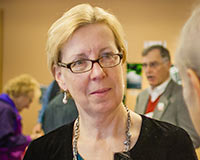SENATOR OSTEN WELCOMES STATE FUNDING FOR WASTE REDUCTION IN MARLBOROUGH AND MONTVILLE
State Senator Cathy Osten (D-Sprague) today welcomed over a quarter-million dollars in state grants to support waste reduction in those two towns.
Both grants – $108,621 for Marlborough and $161,032 for Montville – will be used to support the development of a transfer station-based unit-based pricing system and food scraps recycling program.
“Local towns are facing rising trash disposal costs right now because of a combination of factors, including a lack of local disposal options in Connecticut and the collapse of the recyclables market world-wide. They have to put on their thinking caps and find new ways to handle waste disposal, and that’s what these grants will help them do,” Sen. Osten said.
“With these grants, we’re continuing to support municipalities in their efforts to identify solutions to rising waste disposal costs that work for their communities,” Governor Ned Lamont said in announcing the grants today. “The smart and sustainable programs these grants will support give residents and municipalities more control over their disposal costs.”
Connecticut is facing a growing waste crisis. With the closure of the Materials Innovation and Recycling Authority (MIRA) in Hartford, municipalities have fewer disposal options located within Connecticut’s borders, causing communities to rely increasingly on trucking waste to landfills in other states.
Restoring Connecticut’s self-sufficiency in waste management is critical for a reliable waste system and long-term stability in tipping fees. Many municipalities and regional organizations are taking positive steps to increase diversion and invest in waste management infrastructure, and DEEP has been supporting those efforts through multiple grant opportunities, including the first round of the SMM program and the Materials Management Infrastructure grant program.
The SMM grant program helps municipalities and regional entities respond to this crisis by providing funds to develop and implement a wide variety of waste diversion and reduction programs and initiatives. These programs and initiatives include unit-based pricing systems operated at municipal transfer stations; decentralized food scrap collection units; technical assistance for the startup of an aerated static pile composting facility; curbside food scraps collection; regional composting enhancements paired with an in-vessel composter installation; technical support for the expansion of a regional waste authority’s operations; and a major urban initiative to launch curbside co-collection of municipal solid waste and food scraps within a unit-based pricing system.
The first round of the SMM grant program resulted in more than 1,000 tons of waste diverted across participating municipalities
Share this page:
